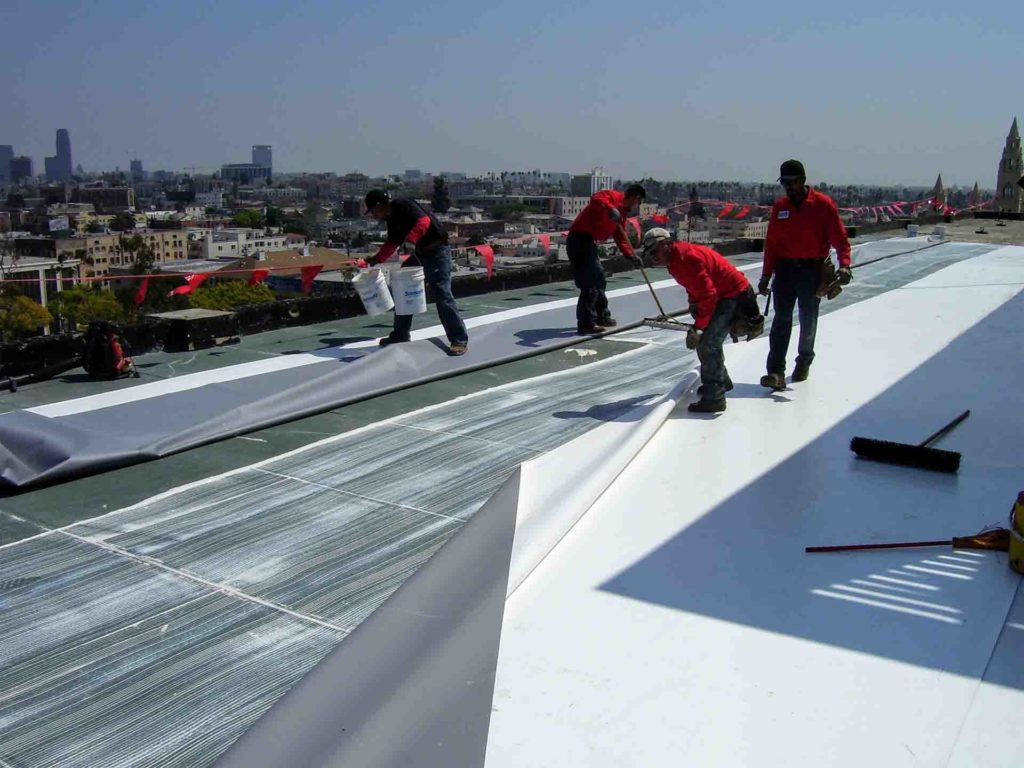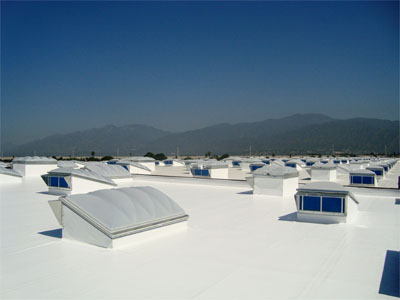What You Need to Know About PVC Roofing Systems: California Commercial Single-Ply Roof Projects
Here at Los Angeles County, California based commercial roofing company Stone Roofing, we have installed Single-Ply Membrane Roofing systems for commercial and industrial properties for over 90 years, including PVC Membranes.
Single ply roofing has become the leading low slope option in commercial and industrial roofing. As its name suggests, Single Ply is a roofing system consisting of one layer of roof material. There are many types of single ply roofing products, most of which are abbreviated using their principal chemical compound. Stone Roofing installs many different single ply roofing systems including TPO, PVC, TPA, PIB, and Hypalon. Single ply roofing benefits include low cost installation, reflectivity, and lack of use of non renewable resources. Single ply roofing is available in a wide variety of types, thickness, colors and installation methods.
Click here to learn more about Single Ply Roofing
When the time comes to consider a roofing or reroofing project for your California commercial roof or industrial facility, property owners and managers have many roof systems and roof surfacing options to consider. When selecting a single ply system, it is important that the system you choose is tailored to the specific project. One of the most popular and effective surfacing alternatives is a PVC roofing system.
PRO TIP: For the very best recommendations, consult with your roofing project manager for the best roofing system, best roofing materials and course of action based on your project parameters.
In this post, we cover everything you need to know about PVC roofing surfaces, including the benefits of choosing PVC for your commercial roofing project.
What is PVC Roofing?
PVC stands for polyvinyl chloride (aka “vinyl” or “PVC” roofs), meaning it is composed of carbon, hydrogen, and chlorine (from salt) on a molecular level. When heated sufficiently, thermoplastics temporarily shift from a solid to a semi-solid state enabling the sheets or panels that are overlapped to fuse together as a solid upon cooling. This process yields one continuous membrane rather than several compressed particles. This process, referred to as heat-welded seam technology, is one of the most beneficial features of PVC. First appearing on roofs in Europe in the 1960s, PVC single ply roofing systems have the longest track record in roofing membranes of all thermoplastics.
Since it has been widely tested and perfected, there are many options with this type of roofing membrane PVC (polyvinyl chloride) is known for its durability along with its affordability. Because of the benefits that come with using PVC, it is one of the most frequently used types of plastic in the market today.
The PVC material is so versatile that it can be processed into a variety of different products with unique performance characteristics, with one of these products being a modular roofing system. Due to PVC’s durability, it is a great roofing material to use because it can withstand even the harshest of conditions and climates and still provide the protection for your roof that you desire.
In addition, manufacturers have the ability to produce a large array of colors, including white, which is heat reflective. PVC can be attached and adhered in several different ways. These options make PVC roofs completely customizable and aesthetically pleasing. Because of the resilience and performance of PVC, many PVC single ply roofing systems throughout the United States that were installed two decades ago are still performing well to-date.
What is PVC Roofing Made From?
PVC is made from two basic components: natural gas or oil and salt. The fuel is converted to ethylene, and chlorine is retrieved from rock salt, one of the most abundant elements on earth. These are joined to produce a white compound known as vinyl chloride monomer, then processed further to produce rigid or flexible PVC. Used extensively across a broad range of industrial and everyday applications, PVC is one of the most widely used polymers in the world.
Below, we’re breaking down the key benefits of PVC Roofing Systems.
Durable & Long Lasting Roofing Solutions
PVC systems can handle a wide variety of rooftop conditions, including resisting many chemicals and other substances that can negatively affect other products. Especially effective on rooftops (restaurants and some manufacturing or industrial facilities) where there is greasy or oily rooftop exhaust, PVC roofing is also highly resistant to moisture and ponding water; under those conditions it doesn’t rot or otherwise deteriorate. This proven durability means less roof maintenance expense and longer trouble-free service life for you.
In addition, PVC roofing systems are long-lasting; it is not unusual to find PVC roof installations that have been on the job for 25 years or more. Because PVC is a plastic, it is flexible and able to accommodate the thermal expansion and contraction that commercial roofing systems undergo as weather and temperature conditions change. Also, PVC membranes don’t “cure” over time, meaning that they remain hot air weldable (for repairs or other alterations) throughout their lifetime.
Lightweight
PVC roofing membranes can often be installed without an expensive and disruptive tear-off of the current roofing system (depending on existing roof condition and local building codes).
Heat Welded Seams
Seams of PVC membranes are heat welded together with robotic welders for water tightness and this method of seaming the separate membrane components of the roofing system – sheets and flashing details – delivers a more secure and longer-lasting membrane seam on the rooftop than other systems that require adhesives. Heat literally melts overlapping membrane pieces together to provide a uniform membrane sheet. The welded joint is actually more tear resistant than the membrane itself.
Flexibility
While other single-ply roofing systems stiffen up when the weather gets colder – making them difficult to handle and seam on the rooftop – PVC remains flexible, enabling it to be installed virtually year-round. Also, because PVC membranes are flexible, they can be easily factory prefabricated before arriving at the jobsite. Factory pre-fabrication significantly reduces on-site labor costs and provides a more reliable, long-term installation due to complex welding procedures being completed under ideal factory conditions.
Chemically Resistant
With the low-temperature flexibility and high-temperature tolerance points of the membrane, PVC is very flame resistant, impact-resistant, and resilient. Unlike other roofing materials with higher carbon contents, PVC membranes offer excellent chemical resistance, making fire ratings easier to achieve as PVC roofing systems are less likely to emit toxic gas in building fires. In flame tests ignited PVC membranes will self-extinguish while other roof systems burn freely, contributing to flame spread and building loss.
Energy Efficiency
White PVC membranes are highly reflective and deliver significant energy cost savings because solar heat is reflected rather than conducted into the building. It is an established fact that rooftop HVAC systems run more efficiently in a cooler rooftop environment. On hot days the ambient air temperature around rooftop units is lower on a white, reflective roof than on a gravel surfaced or black rubber roof.
The high reflectivity of a PVC roof system keeps the membrane temperature significantly lower on hot, sunny days, putting less stress on roof insulation, extending the life of the roof system, and saving energy dollars by keeping the building cooler, allowing HVAC systems to run less and operate in a cooler environment.
Choose a PVC Roofing System for Your Los Angeles or Southern California Commercial Building
There are many compelling reasons to consider a PVC roofing system for your Los Angeles County, California or surrounding counties commercial or industrial facility. You’ll save money over your roof’s lifespan, spend less time and money on roofing repairs as well as reduce environmental impact with energy savings during roof service life.
The commercial roofing company or contractor that installs your roof is as important as the roofing system selected. Stone Roofing has been a commercial roofing company serving Los Angeles County & Southern California for over eighty years.
Should you select Stone Roofing as the contractor for your new PVC roof, you will be assured of long-lasting, watertight protection for your commercial property as well as friendly highly dedicated customer service. We would be honored to evaluate your roofing needs and help determine the best course of action for maintaining the rooftop at your facility. Thank you in advance for allowing us to be of service! Our roofing experts are standing by to answer your questions or to provide a free, no-obligation on-site roofing inspection and estimate.
COMMERCIAL ROOFERS LOS ANGELES – PVC ROOFING SOLUTIONS NEAR ME
Call Stone Roofing TODAY at for your free, no obligation California roofing inspection and estimate.
1-800-31-STONE“Thank you for your hard work. Stone Roofing is always very competitive with their bids and does solid work. Keep up the good work we appreciate Stone Roofing.”

The following FAQs include questions that customers often ask us about PVC roofing systems.
What does PVC roofing stand for?
The term ‘PVC’ stands for Polyvinyl Chloride. The materials are created by a chemical reaction known as polymerization.
How long do PVC roofs last?
PVC roofs can last for 25 years or even much longer. Depending on the care, maintenance and location of your rooftop, your mileage may vary. To extend the life of your PVC roof, ensure you are taking the proper steps to maintain performance.
Can you walk on PVC roofing?
Yes, you can walk on PVC roofing systems as they are designed to be durable and long lasting. However, heavy traffic should be avoided as it can reduce the life of the roof if not careful.


